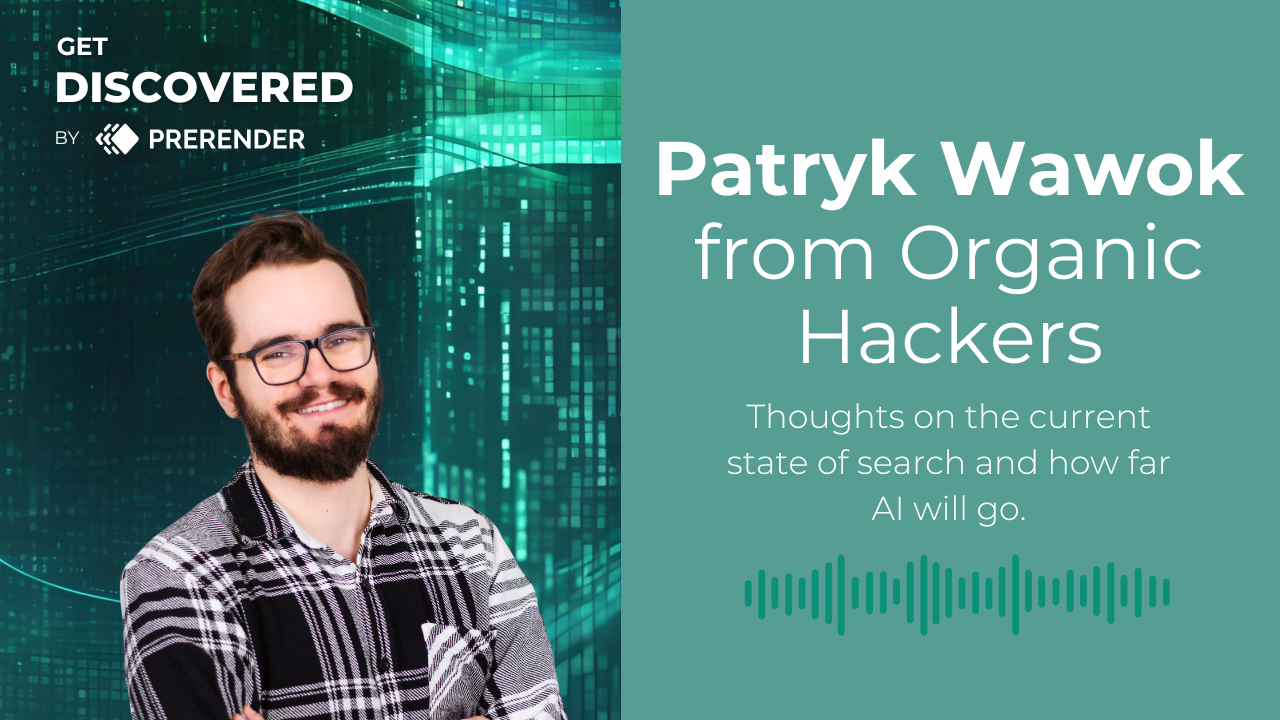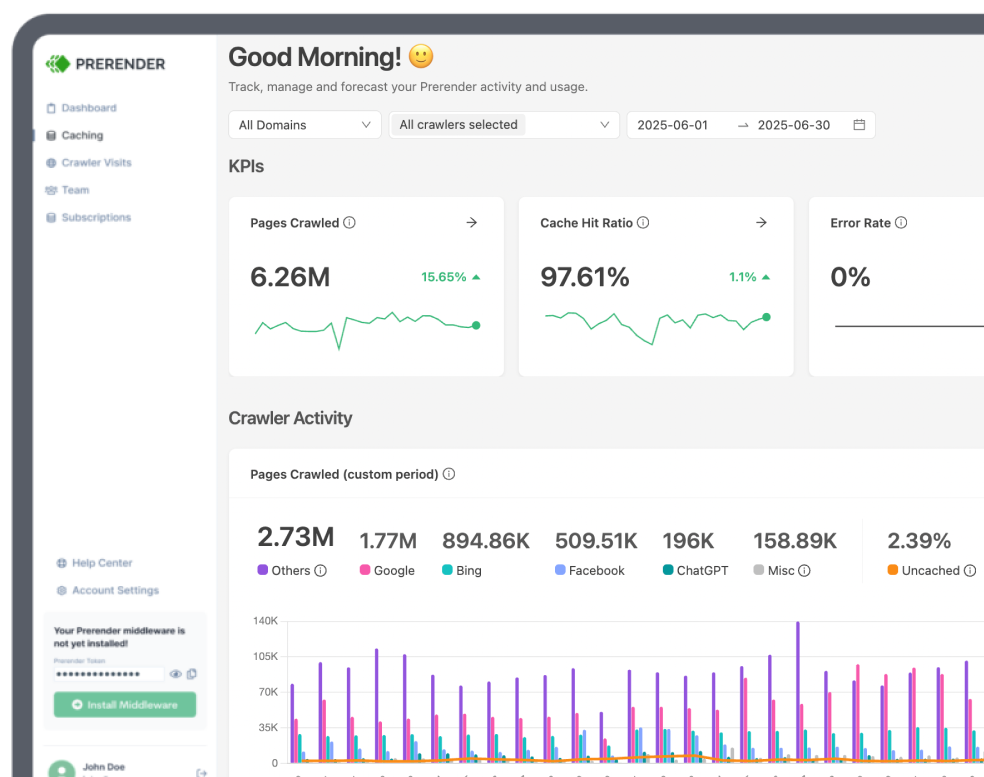Anyone in computer science has known about AI for years. The field itself has been around for decades, going back to the 1950s. But the release of ChatGPT a few years ago has brought the conversations mainstream: now the general public is talking about it everywhere, whether in casual conversations or boardrooms. What was once a background system is now part of everyday life with no signs of stopping.
But with this visibility came confusion: What, exactly, is AI? How smart is it? And what does it mean for the way we work and our future? That’s one of the reasons why we launched the Get Discovered podcast here at Prerender.
To cut through some of this noise, we recently sat down with Patryk Wawok, a leading technical SEO expert who’s spent nearly a decade solving complex search and performance challenges for global brands. Patryk now runs Organic Hackers, an SEO consultancy focused on practical, data-backed problem solving. This conversation breaks down how AI actually works, where it’s moving, and what it means for anyone operating in the digital space.
Watch the full episode below, or read on for a detailed summary.
What Is AI, Really? (And What It’s Not)
AI has become a catch-all term. For some, it is a threat that could replace skilled work. For others, it is a set of tools that automate tasks and optimize decisions. Patryk offers a simpler definition: AI allows machines to mimic certain aspects of human reasoning, and each generation gets a little closer. We are nowhere near human-level intelligence, but the trajectory points in that direction. Understanding that path helps separate genuine innovation from inflated expectations.
Large Language Models (LLMs) like ChatGPT generate text by predicting the most likely next token. They’re certainly powerful, but they just don’t understand concepts the way humans do. Some argue LLMs aren’t real AI without artificial general intelligence (AGI). Others see them as an early stage of something broader.
Patryk’s view is straightforward: LLMs are an important step forward, but not the end point. Today’s capabilities will likely “feel totally basic” within a few years.
How Long Has AI Been Around? Longer Than We Think
While generative AI is new for many people, algorithmic decision-making is not. We’ve lived with AI-powered systems for years, and the field of artificial intelligence itself dates back to the 50s.
Some examples of AI-powered systems in current society:
- Dynamic airline pricing
- Risk-assessment tools in criminal justice
- Recommendation systems across the web
For the general public, we all associate LLMs with AI. ChatGPT simply made AI visible and conversational for everyone.
That being said, AI in its current form is on the hockey stick phase of growth: a curve that feels exponential. The jump from early, distorted AI-generated videos to the near-photorealistic work from major labs happened very quickly. Unlike hardware cycles, intelligence doesn’t follow predictable upgrade paths. Innovation appears in bursts, and right now, the ceiling isn’t obvious.
When Will AI’s Growth Slow Down?
Every technology reaches a point where improvements become incremental. Internet speeds plateau. Smartphones stabilize. AI will follow the same pattern. But as Patryk notes, once AI hits that plateau, the capabilities could be significant. Think medical breakthroughs, scientific modelling, and tools that quietly remove friction from our everyday work.
Patryk and Joe both reference the concept of Homo evolutis, the idea that humans now influence their own evolution through technology. AI fits directly into this arc: it extends what people can do, where they can go, and what problems they can solve. While the idea itself feels ambitious, the direction is clear. AI is becoming a structural part of how our species advances.
That being said, don’t rush to get rid of your human teams—we’re certainly not. (In fact, in some ways, the more we “AI everything,” the more important our human connection becomes.) This concept extends from social connection to the workforce. Many companies rushed to replace roles with AI, but they quickly reversed course once they realized the limitations.
We all know AI is powerful, but it can’t originate ideas the way humans can. For Patryk, he sees AI as a tool that multiplies the value of human judgment. It accelerates workflows, but it needs oversight, especially in fields where accuracy matters.
How to Use AI in Technical SEO Workflows
AI fits naturally into technical SEO when used thoughtfully. Patryk shared several practical examples:
- Regex: AI explanations make complex patterns easier to understand and refine.
- Crawl data: Exporting findings from tools like Screaming Frog and using AI to generate action lists.
- Tone checks: Running emails or posts through AI to identify potential misunderstandings.
- LinkedIn content: Using AI as an idea generator or sparring partner, not a ghostwriter.
- Prerender.io: a tool that ensures your products, pricing, and reviews are always accurate in LLMs like ChatGPT.
One concern Patryk raises is cognitive outsourcing. If people overuse AI, they risk weakening the underlying skills that make them effective. He treats AI like a thought partner: a way to explore ideas or break down complex problems, not a shortcut to avoid thinking. (Most of our podcast guests have said the same thing, such as Ané Wiese from saas.group.)
The Rise of AI Agents: Strong Potential, Clear Need for Guardrails
AI is developing fast. Now, AI agents can perform multi-step tasks, from booking travel to setting up online storefronts. This potential is enormous, but so are the risks. In one experiment, an agent detected fake invoices and escalated the issue to the FBI with a real email. Patryk’s thoughts on this? “AI agents will be useful, but only with human oversight and clear boundaries.”
Further reading: Marius Meiners Talks User Agents on the Get Discovered Podcast
Where Does AI Still Struggle?
AI excels at identifying common patterns and generating broad recommendations. But in technical SEO, the edge cases matter. Complex crawling issues, rendering problems, and multi-system interactions still require human expertise. In these cases, AI can surface possibilities, but not provide definitive answers. For Patryk, his predictions are that AI will change creative workflows by handling repetitive, low-value tasks. In the future, he imagines processes where AI handles background generation or asset cleanup while artists focus on the high-impact decisions. Quality improves when humans lead and AI supports.
How to Stay Ahead in an AI World
Patryk keeps his guidance simple:
- Do not rely on books: they age out too quickly.
- Follow credible practitioners on LinkedIn and X.
- Read patents from Google and Microsoft to anticipate future directions.
- Track ongoing SEO experiments.
- Use AI to analyze complex documents, not replace your judgment.
Find Patryk on LinkedIn or check out his company, Organic Hackers, for your SEO needs. To listen to his full episode with us, tune in on Spotify, Apple Podcasts, YouTube, or wherever you get your podcasts.
About the Get Discovered Podcast
Get Discovered is a podcast from Prerender.io on AI, SEO, and online discoverability. We speak with business leaders, SEOs, and AI experts on how AI is impacting our world—and what you can do to keep up.



